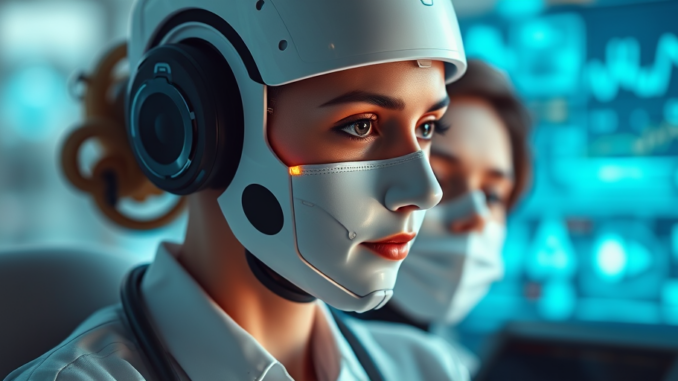
Summary
This article explores the transformative impact of AI in general hospital wards, shifting from reactive to predictive care models. Sahyadri Hospitals in India has partnered with Dozee to implement an AI-powered command center, enabling continuous patient monitoring and early warning alerts. This innovative approach promises to enhance patient safety and improve clinical outcomes.
Main Story
Alright, let’s talk about how AI is really shaking things up in healthcare, specifically in general wards, it’s not just about admin anymore, you know? Instead of waiting for things to go wrong, we’re moving towards predicting what could happen – it’s a real game changer. You see, the old way, with doctors and nurses checking in periodically, it’s just not cutting it, particularly outside the ICU. Delays in spotting issues, it’s, well, it’s bad news for patients, isn’t it? But get this, AI is stepping in with solutions offering preventative care, which is truly revolutionary.
Take Sahyadri Hospitals in India, for instance, they’ve teamed up with Dozee, a medical device company and are really pushing the boundaries. They’ve set up a command center powered by AI in their non-ICU wards. Think about that for a second, they’re trying to get ahead of potential problems and I mean, that’s where the real value is. It’s not just about patient safety, though that’s the key thing, it’s about quicker response times and making it easier for clinicians too. I’ve heard some colleagues say they feel like they never have enough time, that this could allow them to focus on the parts of the job they really need to.
How does it work? Well, the system continuously monitors patients’ vital signs, it’s like having a digital eye on each patient 24/7, that’s a pretty significant upgrade from the typical checkups. This data, it’s analyzed by clever algorithms, they can detect even the slightest changes. When something looks off, the system sends an early warning, it’s almost like a heads-up, allowing healthcare teams to jump in before things get serious. It’s proactive care, it’s as simple as that, and it leads to better outcomes, which I think we can all agree is the most important thing.
Dr. Kapil Borawake from Sahyadri Hospitals hit the nail on the head when he talked about the limitations of their previous reactive approach. He was saying that without this continuous monitoring, things were being missed. Now, with this AI setup, the hospital is moving to a proactive style, and they’ve already done a successful pilot, so they really know what they are doing. That proof of concept, that’s the thing that gets me excited, that’s why everyone is now implementing these types of changes. I remember a conversation last year, talking about this same problem, and we were saying there has to be a way, well now there is and its being adopted widely.
Furthermore, this isn’t just about avoiding emergencies, it’s about freeing up clinicians’ time too. You know, mundane tasks like constantly checking vitals, well, AI can handle it and this means they can focus on what they’re best at: patient care. The AI alerts also mean fewer adverse events, and the data collected can be used to improve healthcare practices. It’s a win-win, isn’t it? Plus, it really helps to provide more personalized care; that’s something we often struggle with.
Indeed, this move towards AI-powered predictive care is part of a big trend. AI is popping up everywhere, from helping with diagnosis and treatment plans to remote monitoring. Sure, there are hurdles to clear, things like data privacy and ethical considerations but the potential is too significant to ignore. I think it’s pretty clear that as AI advances, it’ll only play a bigger role in healthcare. AI offers a future with better patient safety, more efficient care, and a more personalized experience, It’s a future that, quite frankly, I’m excited to see.


So, they’re replacing human eyes with AI eyes? I wonder if the algorithms will start sending passive-aggressive alerts if you haven’t moved enough today?
That’s a funny thought! While it’s not about replacing human eyes, the AI monitoring is designed to be incredibly proactive. It’s more about providing constant vigilance that no human could manage, ensuring patient safety and allowing our healthcare professionals to focus on patient care.
Editor: MedTechNews.Uk
Thank you to our Sponsor Esdebe – https://esdebe.com
So, the algorithms are now effectively playing ward nurse, but does that mean they get to complain about their shifts too?
That’s a humorous way to look at it! It really highlights the continuous nature of the AI’s monitoring. Unlike human staff, these systems won’t get tired, or need a break but perhaps AI could provide feedback on how to improve care quality. That could be the real next step.
Editor: MedTechNews.Uk
Thank you to our Sponsor Esdebe – https://esdebe.com
So, now the AI’s not just watching, it’s *predicting*? Does this mean my future hospital stay will come with a personalized fortune cookie?
That’s a fun way to think about it! Perhaps instead of fortune cookies, the AI could provide personalized insights into your health progress, giving you real time feedback, think of it as a health dashboard!
Editor: MedTechNews.Uk
Thank you to our Sponsor Esdebe – https://esdebe.com